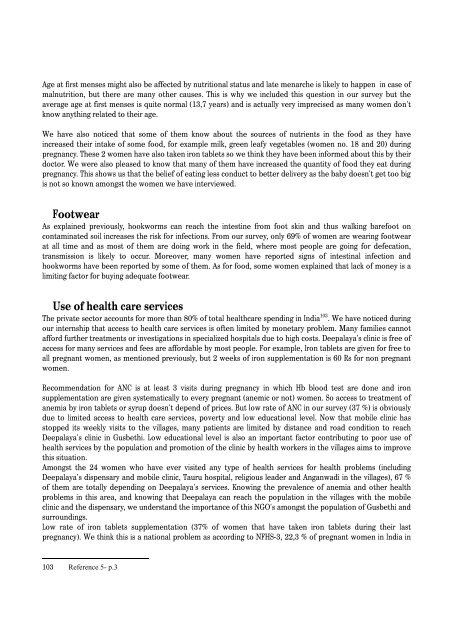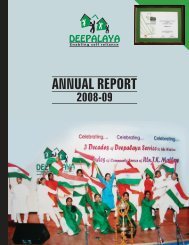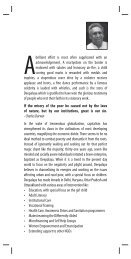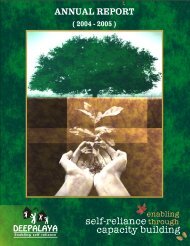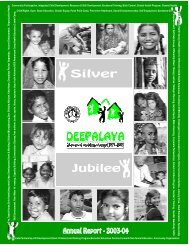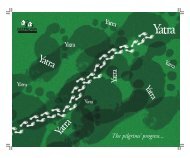Report 2011 - Deepalaya
Report 2011 - Deepalaya
Report 2011 - Deepalaya
You also want an ePaper? Increase the reach of your titles
YUMPU automatically turns print PDFs into web optimized ePapers that Google loves.
Age at first menses might also be affected by nutritional status and late menarche is likely to happen in case of<br />
malnutrition, but there are many other causes. This is why we included this question in our survey but the<br />
average age at first menses is quite normal (13,7 years) and is actually very imprecised as many women don't<br />
know anything related to their age.<br />
We have also noticed that some of them know about the sources of nutrients in the food as they have<br />
increased their intake of some food, for example milk, green leafy vegetables (women no. 18 and 20) during<br />
pregnancy. These 2 women have also taken iron tablets so we think they have been informed about this by their<br />
doctor. We were also pleased to know that many of them have increased the quantity of food they eat during<br />
pregnancy. This shows us that the belief of eating less conduct to better delivery as the baby doesn't get too big<br />
is not so known amongst the women we have interviewed.<br />
Footwear<br />
As explained previously, hookworms can reach the intestine from foot skin and thus walking barefoot on<br />
contaminated soil increases the risk for infections. From our survey, only 69% of women are wearing footwear<br />
at all time and as most of them are doing work in the field, where most people are going for defecation,<br />
transmission is likely to occur. Moreover, many women have reported signs of intestinal infection and<br />
hookworms have been reported by some of them. As for food, some women explained that lack of money is a<br />
limiting factor for buying adequate footwear.<br />
Use of health care services<br />
The private sector accounts for more than 80% of total healthcare spending in India 103 . We have noticed during<br />
our internship that access to health care services is often limited by monetary problem. Many families cannot<br />
afford further treatments or investigations in specialized hospitals due to high costs. <strong>Deepalaya</strong>'s clinic is free of<br />
access for many services and fees are affordable by most people. For example, Iron tablets are given for free to<br />
all pregnant women, as mentioned previously, but 2 weeks of iron supplementation is 60 Rs for non pregnant<br />
women.<br />
Recommendation for ANC is at least 3 visits during pregnancy in which Hb blood test are done and iron<br />
supplementation are given systematically to every pregnant (anemic or not) women. So access to treatment of<br />
anemia by iron tablets or syrup doesn't depend of prices. But low rate of ANC in our survey (37 %) is obviously<br />
due to limited access to health care services, poverty and low educational level. Now that mobile clinic has<br />
stopped its weekly visits to the villages, many patients are limited by distance and road condition to reach<br />
<strong>Deepalaya</strong>'s clinic in Gusbethi. Low educational level is also an important factor contributing to poor use of<br />
health services by the population and promotion of the clinic by health workers in the villages aims to improve<br />
this situation.<br />
Amongst the 24 women who have ever visited any type of health services for health problems (including<br />
<strong>Deepalaya</strong>'s dispensary and mobile clinic, Tauru hospital, religious leader and Anganwadi in the villages), 67 %<br />
of them are totally depending on <strong>Deepalaya</strong>'s services. Knowing the prevalence of anemia and other health<br />
problems in this area, and knowing that <strong>Deepalaya</strong> can reach the population in the villages with the mobile<br />
clinic and the dispensary, we understand the importance of this NGO's amongst the population of Gusbethi and<br />
surroundings.<br />
Low rate of iron tablets supplementation (37% of women that have taken iron tablets during their last<br />
pregnancy). We think this is a national problem as according to NFHS-3, 22,3 % of pregnant women in India in<br />
103 Reference 5 - p . 3


